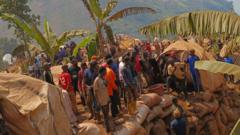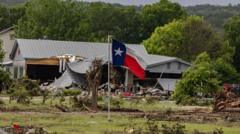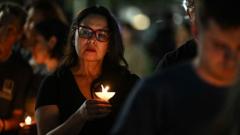The floods have led to over 200 fatalities in Mokwa, Nigeria, with 500 individuals reported missing as rescue efforts cease, signaling a grim outlook for the affected families.
Tragedy Strikes: Over 200 Lives Lost in Catastrophic Nigerian Floods

Tragedy Strikes: Over 200 Lives Lost in Catastrophic Nigerian Floods
Flood destruction in Mokwa leads to a mounting death toll and extensive devastation.
The recent floods that engulfed the Nigerian town of Mokwa have left over 200 people dead, with rescue officials reporting 500 individuals still unaccounted for. The devastation follows unprecedented rainfall that triggered the worst flooding the region has seen in 60 years. Musa Kimboku, the deputy chairman of Mokwa Local Government, informed BBC News that search operations have now come to a halt, as authorities no longer anticipate recovering further survivors.
Areas like Tiffin Maza and Anguwan Hausawa have been particularly hit hard, with local descriptions capturing scenes of utter despair and chaos. Witnesses recounted harrowing tales, such as one man, Adamu Yusuf, who tragically lost both his wife and newborn child to the floodwaters. "I watched helplessly as water washed away my family. I survived because I could swim," he shared. Another resident, Saliu Sulaiman, lamented the loss of around $1,500 in agricultural earnings, stating that while he considered returning to retrieve the money, the sheer force of the water dissuaded him.
In response to the flood crisis, the National Emergency Management Agency (NEMA) has commenced distributing relief packages to the affected community while also reporting damage to crucial infrastructure, including roads and bridges, exacerbating the local economic impacts. The Nigerian Red Cross highlighted the "significant loss of life and widespread distress" resulting from this disaster.
With the Nigerian rainy season traditionally spanning from April to October, such floods have recurred in past years. The tragic memory of 2022 still lingers, when flooding claimed over 600 lives and displaced 1.3 million people. The relentless cycle of natural calamities presents ongoing challenges for communities in Nigeria, leaving families struggling to recover and rebuild their lives.



















